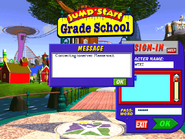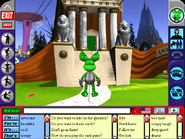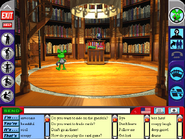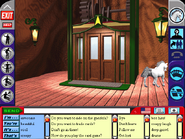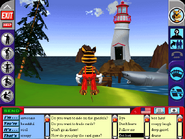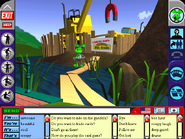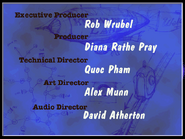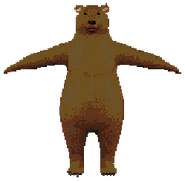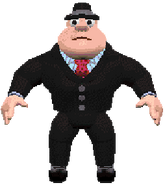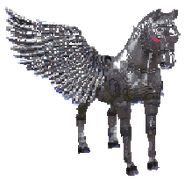KnowledgeLand is a game originally released by Knowledge Adventure in the Fall of 1996.[1] It is not explicitly labeled as a JumpStart game, but it partially serves to promote JumpStart products. It is an example of an early massively-multiplayer online game, though it can also be played single-player.
Gameplay[]
The game's setting is an island called KnowledgeLand, which contains the JumpStart Grade School campus and the Brain Blast amusement park. The player selects an avatar character and explores the different locations in KnowledgeLand. By visiting locations in the JumpStart Grade School campus, the player can interact with demos of JumpStart games.
The player can move their avatar around by clicking on the location or in the direction they would like to go to, or by using the arrow keys. The player's avatar can perform five animations: wave, jump, spin, fall down, and get up. The player can also chat with other players by using the Kidchat feature. The player can create dialogue boxes by selecting words or phrases from a list, which are then spoken aloud by a synthetic voice. Kidchat also includes a set of voice clips and sound effects. The player also has the option to freely input text, provided that the words are included in the game's dictionary.
During the game's initial release period, special events would take place on certain days.[2] Another feature limited to the online multiplayer mode was the presence of quiz-brains, also simply called brains for short, which appeared in certain areas of the Brain Blast amusement park. Some brains would ask the player questions related to math, geography, or other subjects. If the player correctly answered a brain's riddle, then the brain would give the player a secret code. Some brains would ask for a secret code rather than ask questions. Giving a secret code to the correct brain would reward the player with a Knowledge Card.
Knowledge Cards[]
One of the main objectives of the game is to collect Knowledge Cards, and then sort them into hands based on shared attributes. Knowledge Cards are described in the game's manual as the currency of KnowledgeLand, and they contain information relating to various school subjects. Each card depicts a person, place, animal, or thing.
There are three methods of obtaining Knowledge Cards: finding them around KnowledgeLand, trading with other players, and obtaining them from brains. When a new player starts the game, a set of 20 Knowledge Cards are randomly scattered throughout KnowledgeLand. Each day afterwards that the player signs on, additional cards can be found in a concentrated area. These cards can be picked up by either clicking on them, or moving the avatar character over them. In multi-player mode, the player can trade cards with other players at the Trading Table. Here, players can offer up cards for a trade. The trade will only be made if both players agree to it.
The subject of the card determines which of the four main categories it belongs to: Science, Nature, History, or Fine Arts. Some cards also have a Continent or Century attribute, if the card's subject relates to a specific location or time period. A card can have many subcategories as well. For example, a card about an animal may also have attributes such as "mammals" and "herbivores". To learn more about a card, the player can use the magnifying glass to get a closeup view of the card, which shows an image of the subject and a description.
When the player collects Knowledge Cards, they will be stored in the player's Card Cruncher. When the player accesses their Card Cruncher, they can view all of the cards they currently possess. Unsorted cards will appear in the inventory shelf. The player can move cards from the inventory to the sorting shelves above to make hands. Each hand can contain a maximum of six cards. The value of a hand will be displayed as a certain number of points. The more categories that a set of cards have in common with each other, the more points that hand is worth.
The player can choose to cash in a hand of cards to transfer those points to their score. More avatar options become available when the player's score reaches certain amounts. Once cards are cashed in, they will appear in the player's card scrapbook. Cards in the scrapbook can't be used, but they can still be viewed with the magnifying glass.
Locations[]
JumpStart Campus[]
- Toddler Building - Contains a demo of JumpStart Toddlers (1996) which features the activity Give the Dog a Bone.
- Preschool - Contains a demo of JumpStart Preschool (1995) which features the activity Pierre's Picture.
- Pre-K Schoolhouse - Contains a slideshow describing JumpStart Pre-K.
- Kindergarten Schoolhouse - Contains a demo of JumpStart Kindergarten (1994) which features the activity Hopsalot's Garden.
- 1st Grade Schoolhouse - Contains a demo of JumpStart 1st Grade (1995) which features the activity Serving Up Fractions.
- 2nd Grade Schoolhouse - Contains a demo of JumpStart 2nd Grade which features the activity Log Ride.
- 3rd Grade Schoolhouse - Contains a slideshow describing JumpStart Adventures 3rd Grade: Mystery Mountain.
- 4th Grade Schoolhouse - Contains a slideshow describing JumpStart Adventures 4th Grade: Haunted Island.
- KnowledgeLand Library - This area often hosted events during the game's initial release period.
- Lighthouse - A large shark occasionally swims up to the path of the lighthouse.
- Trolley - Transports the player to the 3rd Grade Schoolhouse.
- Construction Site - A non-interactive location that contains a sign that says "Coming Soon: JumpStart 5th Grade".
Brain Blast Amusement Park[]
- Blast from the Past - KnowledgeLand's history area.
- Spell-Binder - KnowledgeLand's language area.
- Numerator - KnowledgeLand's math area.
- Trailblazer - KnowledgeLand's circus.
- Art-a-Whirl - A fine arts carousel.
- Gizmotron - A science Ferris wheel.
- Sky Needle - Contains an elevator and a gondola that leads to the KnowledgeLand Library.
- Supernova - A roller coaster that the player's avatar can ride on.
- Island Hopper - KnowledgeLand's geography area.
Release Information[]
KnowledgeLand was included as a bonus disc with the original 1996 releases of JumpStart Adventures 3rd Grade: Mystery Mountain and JumpStart Adventures 4th Grade: Haunted Island. It was also included in the original release of the JumpStart Grade School bundle, which included all of the original JumpStart Kindergarten through 4th Grade games.
Trivia[]
- A blimp labeled "KnowledgeLand" makes a cameo in JumpStart Adventures 3rd Grade: Mystery Mountain. In the screen showing the outside of the schoolhouse, it will fly by if enough time elapses.
- In a sense, KnowledgeLand can be considered a very distant precursor to World of JumpStart, another game to feature MMO gameplay.
- According to the game's art director, Alex Munn, PowerAnimator was used to develop the game. He also mentioned that the character work was outsourced.[3]
Gallery[]
Screenshots[]
Promotional Images[]
Other[]
Videos[]
References[]
- ↑ JumpStart. (1997). Knowledge Adventure Corporate Backgrounder. Knowledge Adventure. Archived February 4, 1998. Retrieved April 26, 2020.
- ↑ JumpStart. (1997). KnowledgeLand Calendar. Knowledge Adventure. Archived February 4, 1998. Retrieved October 8, 2019.
- ↑ Alex Munn - KnowledgeLand. Archived March 15, 2008. Retrieved July 9, 2021.




